Share

Patrick Daly Interlinks Podcast
Manufacturing in the USA with Lisa Anderson
•
In this episode of Interlinks I converse with Lisa Anderson of LMA Consulting in the Los Angeles metro area about manufacturing in the USA.
We touch on aspects of skills, capabilities, and AI and effective approaches to resolving the apparent dichotomy between resilience and efficiency such as Sales, Inventory, and Operations Planning (SIOP).
We also talk about Lisa's own views on leadership, motivation, and personal resilience as a successful businesswoman operating in a turbulent business environment.
More episodes
View all episodes
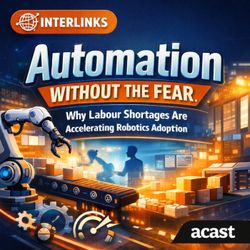
Automation Without the Fear: Why Labour Shortages Are Accelerating Robotics Adoption
29:03|In this episode of Interlinks, Patrick Daly is joined by Michel Spruijt, President of BrainCorp International, a San Diego–based technology company at the forefront of autonomous navigation, machine learning, and computer vision for everyday machines. Michel oversees BrainCorp’s international operations across EMEA, APAC, and LATAM, working closely with global partners as retailers, logistics providers, and manufacturers accelerate their adoption of AI-driven automation.Together, Patrick and Michel explore how the narrative around AI and robotics has shifted—from fear of job displacement to a practical response to chronic labour shortages and rising operational complexity. The conversation spans autonomous mobile robots in retail and logistics, shelf-scanning and inventory intelligence, theft prevention, data interpretation versus data collection, and the growing importance of change management in successful automation rollouts. They also discuss why adoption is happening incrementally, which verticals are moving fastest, and how retailers are turning digital twins and actionable data into measurable ROI.Macro-to-micro strategist takeaway:At a macro level, demographic pressure, labour scarcity, and AI maturity are making automation unavoidable. At the micro level, competitive advantage now comes from translating data into action—aligning technology, processes, and people to deliver real operational outcomes rather than deploying technology for its own sake.Patrick Daly★ The Macro-to-Micro Strategist™╽ Turning Global Turbulence into Operational Clarity ╽ Helping Business Leaders Build Resilient, Profitable Supply Chains ╽ Multilingual Trusted Advisor ╽ Call/WhatsApp ☎️ +353868116030 ╽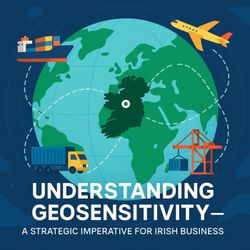
Understanding Geosensitivity: A Strategic Imperative for Irish Business
24:57|Welcome to Interlinks — where strategy meets reality.I’m Patrick Daly, the Macro-to-Micro Strategist, helping manufacturing and distribution leaders turn global turbulence into operational clarity.In this episode, we unpack Geosensitivity—a critical yet often overlooked lens for interpreting today’s geopolitical risk landscape and shaping resilient supply chain and business strategy.You’ll learn:What geosensitivity really means — across five operational dimensions: Materials, Footprint, Transport, Data, and Customers (MFTDC).Why it matters now — in today’s "3N World" of No New Normal, where geopolitical fragmentation, supply chain volatility, and regulatory divergence are converging.How leading global firms like Apple, TSMC, Toyota, and Volkswagen are translating geosensitivity into strategic and operational action.What this means for Irish businesses — including multinationals, indigenous exporters, importers, and logistics providers.How geosensitive thinking can help businesses spot risk earlier, seize new opportunities, and build long-term competitive advantage.From the macro to the micro, this episode connects shifting global dynamics with actionable strategic choices—especially for firms operating at the intersection of trade, technology, and geography.Whether you're managing global operations or planning for future growth, this is a must-listen to stay one step ahead in a world of rising geo-complexity.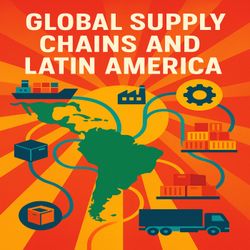
Global Supply Chains and Latin America
29:04|Welcome to Interlinks — where strategy meets reality.I’m Patrick Daly, the Macro-to-Micro Strategist — helping manufacturing and distribution leaders turn global turbulence into operational clarity.In this episode, we shift our focus to Latin America — not as a “region of the future,” but as a present-day economic and supply chain powerhouse with growing importance in a multipolar world.You’ll discover:Why Latin America matters — not just geographically, but economically, demographically, and geostrategically.What the region produces — from critical minerals to food and energy — and how that underpins global industries from EVs to pharmaceuticals.How Latin America fits into U.S., Chinese, and European supply chains — including trade blocs, nearshoring dynamics, and bilateral partnerships.Strategic trends shaping the next decade — from green tech growth and trade integration to regional complexity and global rebalancing.What it means for Irish and European firms — including opportunities for sourcing, refining, manufacturing, and investment — and how to overcome common challenges with a nuanced, strategic approach.From the macro to the micro, I also share insights from my personal and professional experience across the region — from Uruguay to Mexico — showing how Latin America is not a distant risk zone, but a strategic enabler in the global economy.Whether you're rethinking sourcing, diversifying manufacturing, or building resilient, responsible value chains — this episode will give you a fresh, strategic lens on Latin America.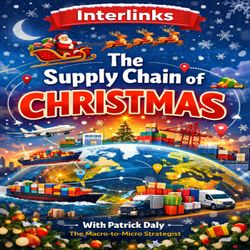
The Supply Chain of Christmas: How the World Delivers One Perfect Day
28:04|Christmas may feel magical, but behind the scenes it is one of the most complex and unforgiving supply-chain operations on the planet.In this special Christmas episode of Interlinks, Patrick Daly — The Macro-to-Micro Strategist — explores how Christmas became the world’s most influential consumer season, stretching across cultures, continents, and logistics networks. In many markets, up to 20% of annual retail sales are compressed into a single, immovable delivery window, turning December into the ultimate annual stress test for global supply chains.The episode reveals how the Christmas supply chain actually begins months earlier, in late summer, as manufacturers, retailers, and logistics providers lock in forecasts, inventory, and transport capacity. By November, systems are running flat out — and even small disruptions can cascade into shortages and delays.Patrick traces the deep historical roots of Christmas consumption, from ancient winter solstice festivals and Roman Saturnalia, through Christian gift-giving traditions, to the evolution of Saint Nicholas into Santa Claus — the original global supply-chain orchestrator.The episode then dives into today’s iconic Christmas supply chains:Seasonal fresh foods like turkeys, where timing and perishability leave zero room for errorToys and electronics, exposing the fragility of long, globalised manufacturing lead timesAlcohol and seasonal beverages, where distribution becomes the real bottleneckParcel and e-commerce logistics, operating at near-redline capacity every DecemberFrom Japan’s Christmas fried chicken to Spain’s turrón, Italy’s panettone, Germany’s stollen, and the Philippines’ Noche Buena, the episode shows how global systems must bend around deeply local traditions.From a macro-to-micro perspective, Christmas reveals a powerful truth: supply chains may be global, but demand is driven by culture, ritual, and meaning. It is the perfect illustration of how long-term planning, precise execution, and zero-tolerance delivery windows come together — all in service of one extraordinary day.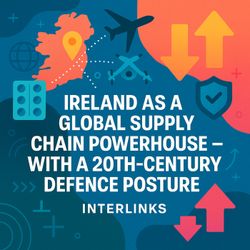
Ireland as a Global Supply Chain Powerhouse - with a 20th Century Defence Posture
28:04|In this episode, we take a candid, strategically grounded look at Ireland’s extraordinary rise as a global supply chain hub — and the uncomfortable truth that our national defence posture has not kept pace with our economic importance.Ireland is no longer a peripheral European state. It is a critical node in global networks for pharmaceuticals, biopharma, medtech, cloud computing, aircraft leasing, and transatlantic digital infrastructure. And yet, our defence, security, and intelligence capabilities remain rooted in a completely different era.In this episode we explore:How Ireland became indispensable to the global economyThe rise of pharma and biopharma, now €116bn in exports and essential to global medicine.Ireland as the digital gateway between Europe and North America — hosting major cloud providers and critical subsea cables.The growth of medtech, establishing world-class hubs like Galway.Ireland’s dominance in aviation finance, managing over half of the world’s leased aircraft.The emergence of HQs, control towers, and orchestration centres that coordinate global flows from here.The strategic contradiction Ireland must confrontDespite this centrality, Ireland maintains a 20th-century defence posture:Almost no air defence capability.Critically weak maritime surveillance.No foreign intelligence service.Limited cyber capacity despite massive digital exposure.A cultural and political reliance on “being looked after” by others.Why this mismatch now threatens our economic modelWe explore how:Country risk is quietly being reassessed by global firms.Insurers, regulators, and ratings agencies are factoring in Ireland’s strategic vulnerabilities.EU partners are increasingly uneasy with Ireland’s under-investment in national security.Hostile actors already understand Ireland’s value — and its weaknesses.What businesses will do if Ireland does not adaptNot by dramatic exits, but by a slow, steady diversification of:Cloud workloadsControl tower functionsHigh-criticality operationsData resilience strategiesWhat Ireland must do — neutral or notA modern state requires modern capability.We outline the essential elements of:Active neutrality (if Ireland remains neutral), orIntegrated security contribution (if Ireland aligns with NATO/EU frameworks).In both cases, the message is clear: Ireland must develop credible defence, intelligence, and cyber capacity - not to become a military power, but to protect what we have built.The Macro-to-Micro Strategist PerspectiveThis episode takes a whole-systems view: linking national security with supply chain resilience, investment flows, board-level risk perception, and Ireland’s long-term economic positioning.It translates geopolitical shifts into concrete operational implications for businesses — showing how something as macro as Ireland’s defence posture cascades into micro-level decisions in cloud architecture, pharma production, medtech planning, and capital allocation.Ireland has spent four decades building extraordinary strategic relevance.Now it must protect it.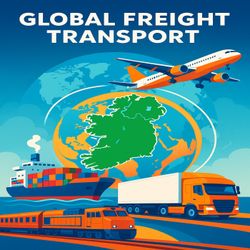
Global Shipping Disruption, Strategic Shifts & The Future of Freight with Howard Knott
29:03|🎙 Interlinks Episode: Global Shipping Disruption, Strategic Shifts & The Future of Freight Guest: Howard Knott, Project Director, Irish Exporters Association Host: Patrick Daly, Macro-to-Micro Strategist | Alba LogisticsIn this episode of Interlinks, I’m joined once again by the ever-insightful Howard Knott, Project Director at the Irish Exporters Association and a long-standing commentator on freight and logistics in Ireland and beyond.Together, we explore some of the major modal transport developments and geostrategic shifts shaping international supply chains in late 2025. We cover a broad range of issues — from disruption in global shipping routes to market consolidation by major ocean carriers, the emergence of alternative trade corridors across Eurasia, and Ireland’s evolving role in transatlantic air freight.💡 What We Discuss:The lasting impact of Red Sea disruptions and Suez reroutingHow shipping giants like CMA CGM and Maersk are vertically integrating into rail and logisticsThe role of AI and digitisation in reshaping SME logistics operatorsRising rail and road freight routes across Asia via the Black Sea and Caspian corridorsIreland’s emerging position in transatlantic and Latin American air cargoThe strategic implications of new air links, including FedEx and IAG Cargo developments🔎 Why It Matters – A Macro-to-Micro Strategy ViewThis conversation offers an on-the-ground lens on how global geopolitical turbulence, climate risk, and infrastructure adaptation are reshaping logistics value chains from the top down. It provides insight into how businesses — especially those in small open economies like Ireland — can respond strategically, by reevaluating dependencies, leveraging new corridors, and strengthening operational resilience.📩 If this conversation resonates with your challenges or opportunities, feel free to reach out to me directly on LinkedIn, or via the contact form at www.albalogistics.com — I’d be happy to continue the conversation.🎧 Listen now and gain strategic clarity in a time of global uncertainty.
Japan's Living Playbook: Modern Systems, Ancient Roots
29:02|Japan is one of the few places in the world where the ancient and the ultra-modern don’t just sit side by side – they actively reinforce each other. In this episode of Interlinks, I take you on a journey across central Japan to explore exactly that: how philosophy turns into behaviour, how culture becomes process, and how long-term strategy shows up in the tiny details of daily life and operations. What I’ve seen on the ground in Japan mirrors my own Macro to Micro concept – the idea that if you want world-class performance, you must be able to connect big-picture intent with frontline action in a clear, disciplined way.We’ll move from Tokyo’s systemised mega-city environment to the rituals of the onsen in Kawaguchiko, along the old Nakasendo samurai trail in the Kiso Valley, through industrial and historical hubs like Nagano, Kanazawa, Kyoto, Uji and Osaka. Along the way, I unpack how Shinto, Buddhism and Bushido still shape modern Japanese supply chains, manufacturing excellence, quality culture and infrastructure. From the Toyota Production System and Hoshin Kanri to supplier relationships and everyday etiquette, we’ll look at how Japan has embedded its values into its economic and operational success – and what that means for leaders trying to navigate uncertainty in their own organisations.As you listen, I’d like you to ask yourself a simple question: what elements of this Japanese Macro to Micro story could you emulate in your own business – in how you set strategy, work with suppliers, design processes or build culture? If this episode sparks ideas about how to translate your own strategy into disciplined execution, I’d be delighted to talk. You can contact me on LinkedIn, or reach out directly by email at pdaly@albalogistics.com to explore how I can help you apply these principles in your context.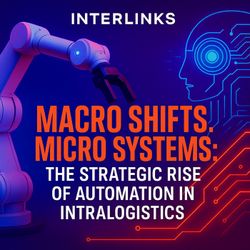
Macro Shifts, Micro Systems: The Strategic Rise of Automation in Intralogistics
29:04|In this episode of Interlinks I’m joined by Clemens Schoeller, VP of Global Consulting and Business Development at AutoStore — a global pioneer in modular, cube-based warehouse automation systems, with over 1,600 systems deployed in 60+ countries.We explore:Clemens’ personal journey through engineering, consulting, and automation leadershipHow AutoStore balances its identity between software intelligence and hardware performanceThe impact of labor shortages, real estate pressures, and customer service demands on logisticsEmerging models like robotics-as-a-service, flexible system scaling, and AI-driven predictive pickingThe role of integrators and the importance of early cross-functional alignment in implementation successThis conversation reveals how demographic shifts, societal expectations, and rapid technological advancement are pushing companies toward more modular, adaptive automation. From labour retention challenges to the rise of speculative AI-driven order fulfillment, it’s clear: resilient operations now require systems that are not only efficient but responsive, scalable, and integrated. Leaders must move beyond cost optimization and embrace automation as a strategic enabler of agility and business continuity.📲 Find me on LinkedIn or join the conversation on Reddit r/InterlinksPodcast. If your business is facing challenges with automation — strategically or tactically — reach out. I’m always open to a conversation about how I can help you bridge global complexity and local execution.Episode HighlightsWhy Modular Automation is Gaining GroundLabour scarcity, retention risks, and negative job perception in logisticsUrban real estate constraints demand higher density, smaller-footprint systemsEvolving SLAs and customer expectations call for faster, more precise fulfillmentAutoStore’s Market PositionStraddles hardware (robotics, bins) and software (routing algorithms, uptime AI)Operates via global partner integrator network — never sells directly to end usersOffers an agnostic consultancy layer for complex, multi-tech projectsShift from Efficiency to ResilienceFrom ROI based on labour replacement to ROI based on volatility responseDemand for “breathing” systems that flex with throughput changesIncreased use of vehicle-based robotics, AMRs, and modular capacity scalingFinancial Innovation in Automation AdoptionGrowing interest in leasing, RaaS (Robotics-as-a-Service), and asset-light modelsQuestions of asset resale, residual value, and upgrade pathways becoming centralPitfalls and Best Practices in ImplementationAvoid siloed decisions — logistics must engage IT, security, and finance earlyIT is now often a gatekeeper in automation decisions (security, integration)Use external consultants where internal capability is thinAI and the Future of FulfillmentPredictive picking based on weather, seasonality, and demand AIEnhanced inventory positioning and dynamic slottingGreater integration between order systems and robotic workflows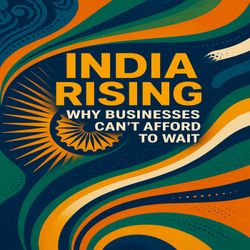
India Rising: Why Businesses Can’t Afford to Wait
26:06|In this episode of Interlinks, I explore the rapidly growing strategic importance of India — now the world’s fourth-largest economy and a critical pole in the emerging multipolar global order. From a macro perspective, India’s re-emergence as a global economic heavyweight is not just a historical correction — it is a fundamental shift in global supply chains, trade flows, and investment priorities. With GDP growth exceeding 6% annually, a population surpassing 1.4 billion, and growing influence in trade, tech, and geopolitics, India is no longer the future — it is the present.I dive into why this matters for Irish companies right now. As the EU–India Free Trade Agreement progresses toward a likely 2025 signing, the playing field is tilting in favour of EU exporters. But the key to success lies in early mover advantage. I unpack the deep cultural and institutional commonalities between Ireland and India — from language and law to diaspora links — and highlight actionable opportunities for Irish businesses in sectors such as pharmaceuticals, premium food and drink, med-tech, ICT, clean tech, and engineering. I also discuss risk factors and how to navigate them with proper preparation and local partnerships.If you’re an exporter, importer, investor, or strategic partner, this episode is your call to action. Don’t wait for the ink to dry on the FTA — the time to build presence, partnerships, and pipeline in India is now. Connect with me, Patrick Daly, via albalogistics.com, on LinkedIn, or join the conversation on Reddit at r/InterlinksPodcast. Let's turn macro shifts into micro strategy — and seize the India opportunity before others do.